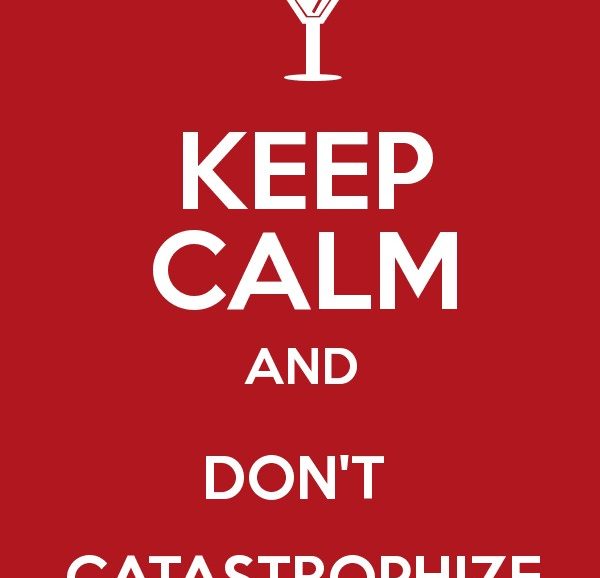Thankfully most of us don’t get that freaked out, but it was a common reaction in 2012 with all the hype of the world ending because it was the end of the Mayan calendar. That is a global example of catastrophizing.
On a day to day basis when things start going in a way we don’t feel is optimal it’s really easy to go even further down the road into catastrophizing mode. Our minds can immediately spin into worst case scenario. “Oh my gosh, if I don’t meet someone soon I never will!” or “If she continues down that path, her life will be in ruins!” or “If I don’t get that promotion, I’ll be stuck in this rut forever!” Any of those scenarios sound familiar? If it’s not you who does that, maybe you know someone who does.
What Can Happen if We Catastrophize Too Often?
It’s normal for everyone to catastrophize at some point. It’s when it becomes a habit or a mainstay of our thinking that it can have negative effects on our life. It’s not healthy for us to be constantly paralyzed by fear because we played out the worst-case scenario in our head. Unfortunately, the more we think of all the negative things that can happen, it can become a self-fulfilling prophecy and then what you worry about happens. Who wants that? Exactly, you don’t.
Catastrophizing can also lead to under-achievement because we constantly think we won’t be able to accomplish anything. It can also affect our outlook on life making us hopeless and spiral into self-pity. Nothing is ever going to work out is the common theme for catastrophizers.
In the therapeutic world, catastrophizing is considered a thinking error or cognitive distortion, meaning we’re not looking at things accurately or rationally. It can also be called magnifying because we’re expecting the worst to happen whether it’s with a current or future situation. We look at things as more severe than they really are.
The Worst is Often the Least Likely to Happen
Teenagers tend to do this because drama is part of their world. If you have a teenager or young adult child it’s not too late to help them course-correct. My son, who’s a teen, will sometimes do it. Then I have to steer him back to reality and remind him many things can happen, so why think the worst? The worst often is the most unlikely scenario. If you catch yourself catastrophizing, remember that.
Catastrophizing goes back to caveman days when we were steeped in survival. If you’re going to wander out of the cave, you’d best consider all the things that could happen. Because back then, they probably would. Nowadays we are thankfully so far removed from caveman days. We no longer need to think the worst. But we still do.
Why do we? Oftentimes it’s habit. We were raised that way and don’t even know we do it.
How Do We Stop It?
- As with any other habit, the first step to changing it is to be aware you’re doing it. Catch yourself in the moment. Then remind yourself it’s not very likely it will happen. Just because one day or one situation was bad, it doesn’t mean that all days or all situations will be bad. That is an incorrect assumption.
2. If you can’t quite move to positive mode, ask yourself what is another, less negative outcome that can happen? On a scale of one to ten with ten being the worst, can you find some fives? Sixes? Maybe even sevens? Anything that’s not a nine or ten.
When we have anxiety about the future is when we get into our head and start thinking of all the things that can go wrong. Don’t go there. Why torment yourself? I know, easier said that done, but again, once you see you’re doing it, you can stop it.
3. To move into more expansive thinking, instead of dwelling on the worst case, ask yourself, “What can happen instead?” Engage the universe by asking, “Show me some possible positive outcomes.” When you trust your intuition and know that the universe has your back, asking these questions becomes a whole lot easier because then you can hear and accept the answer.
4. If your mind is caught in a negative loop, replace those negative thoughts with affirmations. Have some handy on your phone to refer to. Affirmations, in my opinion are not the cure-all as some self-help people lead you to believe, but that’s another story. However, they can serve a purpose. One of which is using then as a re-direct. If you’re having trouble stopping that endless loop of negative thoughts, pull up your affirmations and start saying them. It’s a way you can help quiet your mind.
5. Learn to distinguish between unpleasant outcomes and catastrophes. No one likes an unpleasant outcome, but it happens to us all and can be adjusted. Just because you messed up something at work doesn’t doom you to a life of failure. We all do it. Find a solution and move on.
6. If we have healthy coping strategies, we’re less likely to predict the worst. Part of healthy coping is reducing stress and anxiety in your life. When we’re stressed out and anxious is when we’re more susceptible to irrationally forecasting negative events.
The world didn’t end in 2012 and your life won’t end either over your negative thoughts. Just remember that next time you feel those negative predictions coming on.






